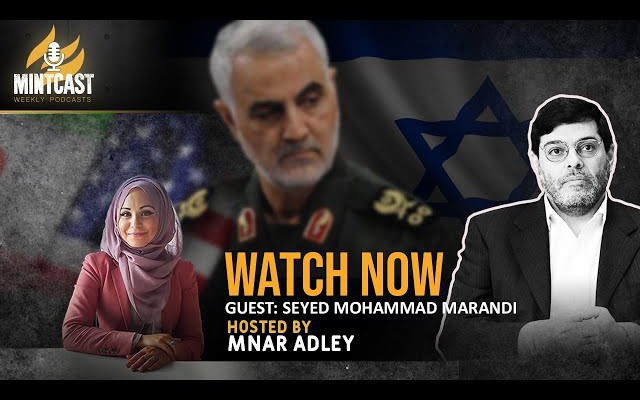Seyed Mohammad Marandi on the Iran Deal and the Assassination of Soleimani

Western media largely sided with the U.S. after Trump’s decision to kill him. Suddenly, Soleimani was no longer a hero, but “the world’s no. 1 bad guy,” as CNBC put it.
World leaders have descended upon Austrian capital Vienna to participate in the ongoing nuclear deal being negotiated primarily between the United States and Iran. Today, MintPress spoke to Dr. Seyed Mohammad Marandi, Professor of English Literature and Orientalism at the University of Tehran. Dr. Marandi is currently in Vienna as part of the Iranian delegation.
While corporate media often portray Iran as a recalcitrant pariah and the United States as a long-suffering broker in the situation, Dr. Marandi notes that it was actually the Trump administration that unilaterally walked away from the agreement. Furthermore, President Barack Obama refused to live up to his promise to remove financial sanctions against Iran. “Obama, from the very beginning, was violating the deal, the most important element of the deal, because the banking sector sanctions are the most important part of the deal,” Marandi told Mnar Adley today.
While corporate media often portray Iran as a recalcitrant pariah and the United States as a long-suffering broker in the situation, Dr. Marandi notes that it was actually the Trump administration that unilaterally walked away from the agreement. Furthermore, President Barack Obama refused to live up to his promise to remove financial sanctions against Iran. “Obama, from the very beginning, was violating the deal, the most important element of the deal, because the banking sector sanctions are the most important part of the deal,” Marandi told Mnar Adley today.
Relations between the two countries fell to a new low two years ago this month, after the Trump administration carried out a successful drone strike against General and statesman Qassem Soleimani. While then-Secretary of State Mike Pompeo insisted that Soleimani was on the verge of carrying out an attack on Americans, the Iranian leader was, in fact, in Iraq on the invitation of Prime Minister Adil Abdul-Mahdi. Abdul-Mahdi specifically asked Trump for permission to invite Soleimani to his country. Trump acquiesced, then used the opportunity to kill him via a drone strike.
In response, the Iraqi parliament passed a unanimous resolution on January 5 (with many abstentions), calling for the expulsion of all U.S. troops. Instead, the U.S. announced it would build a number of new bases on the Iranian border, ramping up the tensions. Since then, Washington has continued to pile on the pressure, increasing its deadly sanctions regime against the country.
Soleimani’s assassination was not a purely American affair. Just weeks previously, he had survived an Israeli attempt on his life. Later that year, Israel would also successfully assassinate top Iranian nuclear scientist Mohsen Fakhrizadeh. Dr. Marandi and MintPress today discussed how the United States and Israel often collaborate to further their shared interests in Western Asia.
Soleimani was best known and celebrated outside of Iran for leading the fight against ISIS in Iraq and Syria, successfully crippling their forces. The Financial Times described him as the “hero” who saved the region from Jihadists. Yet Western media largely sided with the U.S. after Trump’s decision to kill him. Suddenly, Soleimani was no longer a hero, but “the world’s no. 1 bad guy,” as CNBC put it. One reason for the shift in opinion in the U.S. was that Soleimani had impeded their attempts at regime change in Syria. As Marandi noted, emails published by WikiLeaks showed that the U.S. government was secretly working with Al-Qaeda to overthrow the Assad government, explaining:
When the dirty war in Syria began in 2011, the Iranians were not involved and, in fact, were advising the Syrian government to be careful, not to let civilians be killed and they were pushing the government to listen as much as possible to dissenting voices. But the Iranians also immediately recognized that there was a dirty war beginning … that Al-Qaeda was active in Syria.
The discussion also encompassed the sanctions placed on Iran by the United States and how Iran has partnered with Venezuela and other countries to help them neutralize the worst effects of economic warfare.
Seyed Mohammad Marandi on the Iran Deal and the Assassination of Soleimani
 TheAltWorld
TheAltWorld 
0 thoughts on “Seyed Mohammad Marandi on the Iran Deal and the Assassination of Soleimani”